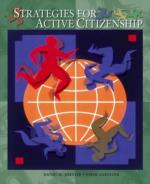|
This section contains 1,148 words (approx. 4 pages at 300 words per page) |

|
Citizenship is the status of being a legally recognized member of a nation-state or other political community, possessing rights such as voting and owing duties such as jury service. In democratic thought, citizens generally are expected to be more actively involved and influential than citizens of authoritarian political systems. By joining environmental organizations, writing letters to government officials, working as volunteers, and otherwise affecting civic life, millions of citizens have helped bring about improvements in environmental policy, AIDS-HIV treatment, civilian nuclear power, genetically modified foods, and other technological endeavors.
In the city-state of ancient Athens, members of the demos participated directly in public debates and governmental choices, a time-consuming responsibility and honor—but only for the minority of the adult population who were not females, slaves, or otherwise excluded. When democracy was reinvented on the scale of the nation-state in Western Europe and the United States, citizenship extended...
|
This section contains 1,148 words (approx. 4 pages at 300 words per page) |

|


